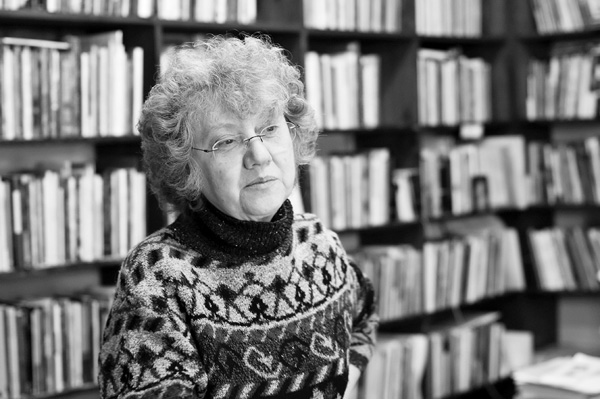Grolier’s owner gets award, then returns to changing lives through poetry

Louisa Solano reflects in November 2005 at her Grolier Poetry Book Shop, a mainstay of Harvard Square. (Photo: Ken S. Kotch)
It’s not that the lifetime achievement award given her last night didn’t mean much to Louisa Solano, owner of the Grolier Poetry Book Shop in Harvard Square.
It’s just that there’s so much more she intends to achieve in her lifetime.
Solano was honored with the Ibbetson Street Press’ award at the Somerville News Writers Festival mainly for single-handedly owning and running the Grolier, the country’s oldest store selling only poetry, for 31 years.
Although winning awards is nothing new to Solano — her honors include being named one of the top “70 women who have made a difference” by the Women’s National Book Association — the Ibbetson award meant “an enormous amount” to her.
Solano is pleased to be publicly recognized not only for her skills as an owner of a long-standing successful business, but especially as someone who has changed the lives of many members of her community.
“It’s very satisfying, helping people who don’t know much about poetry,” Solano said Saturday. Her goal of bringing poetry into the lives of as wide an audience as possible is not something her predecessor, Gordon Cairnie, shared. Solano points out that although she greatly admired the former owner, she has made a number of important changes to the shop, all fueled by her wish to reach more of the general community.
When Solano took over the store in 1974, the great majority of the works stocked were by men, which didn’t suit her feminist leanings. Solano has always been careful to make sure there is an equal ratio of poetry by men and women, even in the face of criticism by customers who asked for “real poetry” when handed books by female poets.
Her efforts for minorities do not end there — Solano is well known for stocking controversial works. Bookshelves are her battleground.
In her younger years, she tested the waters of the 1960s political demonstrations and found them too overwhelming.
“I took my activism to a safer place,” she said.
Her shop is her “cocoon,” where she can work up the confidence for self-expression and exposure to new ideas.
The Grolier embodies what Solano feels is slipping away from Harvard Square. Having grown up in the area, Solano remembers the community being populated by intellectual eccentrics, with “a vibrancy in the air that you just don’t feel now.”
It was a place where creativity thrived and one was constantly exposed to novel, sometimes jarring, ideas. Visitors left the area changed, more open-minded. Today, she says, “the most creative things around here are the ice cream stores.”
Solano hoped that by bringing poetry into people’s lives, she could do what Harvard Square used to — broaden minds.
Solano said she looked forward to continuing her work and sharing her love of poetry.
“It’s the only thing in my life I’ve ever wanted to do,” she said.
Her plans include sponsoring poetry readings, such as those she has run at the nearby Adams House, but adding music to the events, bringing together two of her passions.
